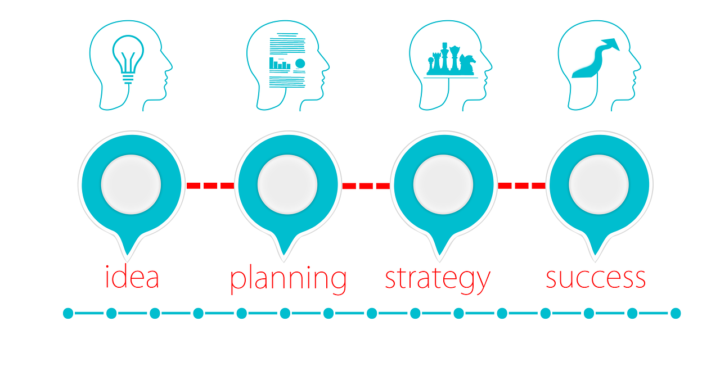Have you ever set goals you’ll actually achieve?
Setting goals isn’t just an over-stressed strategy tossed around by self-help gurus to sell products or their coaching services. It’s a serious game-changer for anyone looking to make positive and demonstrable strides in their life, whether it’s your career, relationships, health or financial status, setting goals can really help. If you don’t believe me, look around at the people you know – which ones seem to achieve more? You’ll probably find that it’s the people who are organised, focused and set themselves some goals. Or more specifically, people who have set goals they’ll actually achieve.
That’s because goals provide direction. Think of them like a GPS for your own ambitions. Without them, you’re wandering aimlessly, hoping to stumble upon success. Like firing an arrow into the air and hoping it will hit the bullseye in the centre of the target. But with them, you’ve got a clear outcome , even if at first glance, the path may seem hidden. The path (or paths as there is usually more than one way to achieve a goal), will develop as you focus on where you are, and what you need to do to get to where you want to be.

The psychology of goal setting
Let’s dive into the psyche here a little bit. Psychologists say that having clear goals boosts your motivation. That’s because every time you progress towards your target, even by some small but detectable amount, your brain releases endorphins, good-feeling chemicals which push you to strive even further. The buzz you’re getting from achieving small milestones is real, and it’s tangible. It’s one of those little life hacks that most people don’t take advantage of.
Not all goal advice out there is golden. There is often a misconception that all goals need to be life-changing and transformative. But that’s not entirely true, and I’m not denouncing these goals if you have them, but setting goals that are unachievable has a demotivating effect because they seem too large, too difficult and cause many people give up.
Big dreams are great, in fact they’re something we all have, but they are best when built on smaller, very achievable steps. Huge goals can feel like trying to scale Mount Everest without any gear, in the rain and in flip flops! But here’s a trick to master here: break big goals into manageable pieces. Just like you wouldn’t eat a whole pizza in one bite, don’t tackle your goals all in one go. Slicing them into smaller, bite-sized steps makes them much more digestible and less daunting. Take it day by day; progress is progress, no matter how small. The small wins are what actually keep you motivated in the long run. Breaking myths around goal-setting means recognising that tiny steps matter just as much as those epic ones, and that’s ancient wisdom not modern jargon. After all, Lao Tzu is reported to have said, “The journey of a thousand miles begins with a single step” and that was over 2500 years ago!

Defining goals is like setting the stage for your own personal success story. They’re the markers that show you’re on the right track, keeping you accountable and pushing you forward when things get tough. So with the right mindset, and a good grasp of what goals can do, you’re already halfway there to achieving something great.
How to set achievable goals
Setting goals you’ll actually achieve is all about being SMART which you may have heard of in relation to setting goals.
SMART is an acronym that stands for:
- Specific
- Measurable
- Achievable
- Relevant
- Time-bound
Basically, it’s about starting with something crystal clear, that you can understand, something you can measure, and that you can achieve withing a given timeframe. So, instead of saying, “I’ll get fit,” a SMART goal would be: “I’ll jog every Monday, Wednesday, and Friday for 30 minutes, and do that for a month.” In this goal, all the criteria for the SMART framework are covered. “I’ll get fit” is too generic, too wide, and how would you define how fit is fit anyway?!
In the SMART version, you’re setting the rules of your own game much more specifically, and it’s much easier to win the game when you know the rules and can see the score.
For more information on SMART goals, see: SMART goals tips and download
Be flexible
Flexibility is important, too. Life loves throwing curveballs at us and sometimes, your original plan just isn’t working anymore, or when you dissect it honestly, you realise that it’s no longer what you want. That’s OK. It’s crucial to keep reassessing goals to keep them relevant. Goals aren’t set in stone; they’re more like speed limits on a road, or a path through a labyrinth. Sometimes slowing down, taking a detour, or even going back on yourself is part of the journey, and in truth, the journey is the most important part.

So, be prepared to be flexible; adjust your goals as you move forward. Sticking too rigidly to what you wanted to do 10 years ago, might be the very reason you’re not succeeding.
Ways to stay committed and ensure you achieve your goal
After setting your SMART goals, the next step is sticking to them. This is where many of us stumble and fall. Stumbling and falling is fine, but the main thing to do is to always get back up.
Progress tracking is your best friend here. It’s like having a fitness tracker but for your life goals. You can make a chart, set up a spreadsheet, put stones in a jar – the way you record your progress doesn’t matter but it is best decided by you. The important thing is to do it! Record your smaller milestones as you hit them, and don’t underestimate the power of seeing how far you’ve come. It’s not just about reaching the end, as I said, it’s about the journey, too.
Accountability partners can also work wonders when setting goals you’ll actually achieve. Having someone to check in with or even work alongside you can keep your motivation thriving. It can be a friend, a colleague, an app or a coach. They’re all there to cheer you on, celebrate your wins and keep you on track when you’re tempted to quit. It’s way harder to fall off the wagon when you know someone’s watching and cheering you on from the sidelines.

Visualisation is a great little trick that packs a punch too, and can access the power of the universe through the law of attraction. Picture what success looks like for you – it could be holding that university degree, enjoying a healthier you, or even launching your own business. Then make that image vivid: hear the sounds of success, feel it in your body, the emotions of success, and focus on that image for a few minutes. Doing this every day sends a powerful message to the universe and engages unseen forces to help you, helping you to set goals you’ll actually achieve.
Ultimately, setting goals you’ll actually achieve is about keeping your eyes on the prize, being flexible and staying true to what you set out to achieve. With the right mindset and tools at your disposal, your goals will be achieved in no time.
Take aways on how to set goals you’ll actually achieve
- Set SMART goals
- Break them down into smaller chunks
- Find an accountability partner
- Chart your progress
- Celebrate small milestones along the way
- Be flexible and review regularly
- Use the power of the universe and visualisation to help you

Related posts
Think BIG: Imagination and the law of attraction
Consistency is the Key to Success: Top 10 Tips For Being Consistent
How to be the change you want to see: 4 steps to success
See also:





Hello Gail!
Goal-setting can feel overwhelming, but this article simplifies the process so well! I love how it emphasizes breaking goals into actionable steps—that’s been a game-changer for me.
Have you found any specific techniques that make sticking to timelines easier? I sometimes struggle with balancing ambitious goals with realistic timeframes. Also, I’d be curious to know how you recommend staying motivated when progress feels slow.
This article really got me thinking about how I can refine my approach—thanks for sharing such practical insights!
Angela M 🙂
Hi Angela. Thanks for your comments. There are many times when progress is slow and it is important in those times to remind ourselves of WHY we want to achieve our goals. Esther Hicks said that the reason we want anything is because we think we will feel better in having it, and I totally agree with her take on this. When progress is slow, it’s important to remember WHY we are striving for the goal. Whether that’s more money (so we have more time and freedom), a better relationship (so we feel more loved) or a new car (so we can get easily from A to B). When you understand WHY you want something, getting back on track to achieving it is so much easier.
Regarding timelines, it’s important to set realistic timelines. Losing 2 stone in a week is not realistic, but 2 pounds a week is. Setting yourself reminders and checking daily with what you have done also helps you stay on track because even if you missed a milestone, but you commit to doing it on another specific day, that’s still working towards your goal.
Gail Lowe’s post on setting goals that you’ll actually achieve is an insightful guide to turning aspirations into actionable success. Her comparison of goals to a GPS is particularly apt—without clear objectives, we’re like wanderers hoping for accidental achievements, but with goals, we’re equipped with a map to our destination.
One key takeaway is the importance of making goals SMART: Specific, Measurable, Achievable, Relevant, and Time-bound. This approach transforms vague ambitions into well-defined targets, making progress measurable and tangible. For instance, “I’ll get fit” becomes a structured plan like jogging thrice a week for a month, making success feel attainable.
Gail’s emphasis on flexibility and regular reassessment is equally valuable. Life is unpredictable, and sticking rigidly to outdated goals can be counterproductive. Adjusting your objectives as circumstances evolve ensures they remain relevant and motivating.
The concept of breaking down large goals into manageable steps is a game-changer. Achieving small milestones builds momentum and keeps you motivated. Combined with progress tracking, accountability partners, and visualization, this creates a robust system to stay committed.
Overall, Gail’s practical tips and motivational insights make this a must-read for anyone looking to turn dreams into reality.
Thanks for your kind comments and discussions on this topic and I’m really pleased that you found it useful. I’ve often set goals in the past that fell by the wayside when it came to achieving them, hence my learning presented in this post. I’ve also learned that getting up and keeping going is also invaluable to achieving anything. I wish you the best in your own endeavours. Gail
This article provides a fantastic framework for setting and achieving meaningful goals, and I completely agree with the importance of breaking larger goals into manageable steps. I’ve found that using the SMART method has helped me stay focused, especially when tackling career milestones. For example, when I aimed to improve my public speaking skills, I set a goal to deliver one presentation per month for three months. Tracking my progress and celebrating small wins made a huge difference.
I’m curious, though—how do others stay motivated when life throws those inevitable curveballs? Do you have any go-to strategies for reassessing or pivoting goals without losing momentum? Let’s discuss!
Hi Herman. Thanks for your insights and comments here and good to hear you’ve succeeded in your public speaking course. To answer your question, I do have some go-to strategies to use for those times when people start to lose a bit of momentum. Mostly they are around being kind to ourselves and accepting that life has ebb and flow and there are times when we surge forward, and others where we need to take stock a little. However, the main thing is to always reassess and reconsider your goals from where you are now. In fact, the main point is to not look back with regret, but focus only on the end goal and make a new path from where you are. Looking back with regret creates a negative energy which is not helpful but looking back with appreciation for the learning you have gained is much more positive. Let me know what you think?
Hey a great post you have here!
Posts like these are essential especially since many do struggle with following their goals to the fullest evermore so when they don’t have a secure plan to follow.
Achieving big goals take their time and are more easier followed when made up of smaller goals like you have mentioned.
Thanks again and have a great day!
Thank you Sariya for your kind comments. I know that many people do struggle sometimes, and I’m one of them which is why I like to share different ways to do things. I hope you are enjoying your own success. Gail
I’ve always struggled with setting goals that I actually stick to. I used to set massive, vague goals like ‘get in better shape’ or ‘be more productive,’ and, unsurprisingly, I never got very far. I’ve tried several different goal-setting methods in the past – daily to-do lists, vision boards, even those fancy productivity apps – but I found myself abandoning them quickly.
The SMART method you discussed resonates strongly with me. This approach of breaking down big goals into smaller, more manageable steps makes a huge difference and I’m inspired to start using this method in my personal & professional life. But I’m wondering if you have any recommendations for dealing with setbacks or unexpected challenges that can derail progress?
Hi Dan. Thanks for your comments. You’re experience is not alone. I have a couple of ways to deal with unexpected challenges or setbacks.
1) Be kind to yourself – we all have ebb and flow and sometimes, taking a step back helps you see the bigger picture or a different solution so don’t give up, just get up and start again.
2) Find a buddy to help you with your goal. They can encourage and console you and it is always easier to do things if you have someone to report to and to help.
3) If the goal is still too big, break it down further so that the steps are manageable and you can achieve them, however small.
Hope these help.
Gail